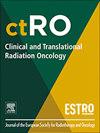Post-treatment changes in bowel and urinary function in prostate cancer patients treated with moderate or ultra-hypofractionation: A prospective cohort study
IF 2.7
3区 医学
Q3 ONCOLOGY
引用次数: 0
Abstract
Objective/Purpose
Hypofractionation (HF) has been established as safe in prostate cancer (PCa) trial populations. We evaluated post-treatment changes in health-related quality of life (HRQoL) outcomes after moderate (MHF) or ultra-hypofractionated (UHF) radiotherapy in a real-world PCa patient population.
Methods
In this prospective cohort study, T1-4N0M0 PCa patients receiving MHF (20x3/3.1 Gy, n = 140) or UHF (7x6.1 Gy, n = 138) were assessed. UHF was not prescribed in case of T3b/T4 disease or an impaired baseline urinary function. Patients completed the EPIC urinary and bowel domains and the EQ-5D-5L (general HRQoL) at baseline and 6 months post-treatment. Thresholds for minimal clinically important differences (MCID) were defined at 8 %. Prognostic factors were assessed using regression models.
Results
Proportion of the total cohort with MCID deterioration for bowel and urinary function was 20 % and 17 %, respectively. Deteriorations in bladder and bowel function significantly correlated with declined scores for general health, usual activities, pain/discomfort, and depression/anxiety. Predictive factors for urinary function deterioration at multivariable analysis were androgen deprivation therapy, age ≥ 75 year, MHF, and grade ≥ 2 acute urinary toxicity. For bowel function deterioration, no factors were identified.
Conclusion
We assessed post-treatment changes in HRQoL in a clinical PCa patient population treated with MHF and UHF, and observed changes comparable to previous trial reports. Deteriorations in bowel and urinary function correlated with worse general health scores. Results for urinary function loss suggested a consequential effect of acute urinary toxicity.
接受中度或超高分剂量治疗的前列腺癌患者治疗后肠道和泌尿功能的变化:前瞻性队列研究
目的/目的低分割术(HF)在前列腺癌(PCa)试验人群中是安全的。我们评估了现实生活中PCa患者群体在中度(MHF)或超低分割(UHF)放疗后健康相关生活质量(HRQoL)结果的变化。方法在本前瞻性队列研究中,对T1-4N0M0例接受MHF (20x3/3.1 Gy, n = 140)或UHF (7x6.1 Gy, n = 138)治疗的PCa患者进行评估。在T3b/T4疾病或基线泌尿功能受损的情况下不开UHF。患者在基线和治疗后6个月完成了EPIC泌尿和肠域以及EQ-5D-5L(一般HRQoL)。最小临床重要差异(MCID)阈值定义为8%。采用回归模型评估预后因素。结果在整个队列中,肠道和泌尿功能MCID恶化的比例分别为20%和17%。膀胱和肠道功能的恶化与一般健康、日常活动、疼痛/不适和抑郁/焦虑得分的下降显著相关。多变量分析显示,雄激素剥夺治疗、年龄≥75岁、MHF和≥2级急性尿毒性是泌尿功能恶化的预测因素。对于肠功能恶化,没有发现任何因素。结论:我们评估了临床PCa患者接受MHF和UHF治疗后HRQoL的变化,观察到的变化与之前的试验报告相当。肠道和泌尿功能的恶化与较差的总体健康评分相关。尿功能丧失的结果提示急性尿毒性的后果。
本文章由计算机程序翻译,如有差异,请以英文原文为准。
求助全文
约1分钟内获得全文
求助全文
来源期刊

Clinical and Translational Radiation Oncology
Medicine-Radiology, Nuclear Medicine and Imaging
CiteScore
5.30
自引率
3.20%
发文量
114
审稿时长
40 days
 求助内容:
求助内容: 应助结果提醒方式:
应助结果提醒方式:


